Battle
As an ongoing part of the Balkan Wars, the Ottoman Vardar Army retreated from the defeat at Kumanovo and regrouped around Bitola. The Serbs seized Skopje then sent forces to help their Bulgarian ally besiege Adrianople. The Serbian 1st Army, advancing south on Monastir (modern Bitola), encountered heavy Ottoman artillery fire and had to wait for its own artillery to arrive. According to French Captain G. Bellenger, writing in Notes on the Employment of Artillery in the Balkan Campaign, unlike the Ottomans, Serbian field artillery was very mobile, at some point the Serbian Morava Division dragged four long-range artillery pieces up a mountain, then each night hauled the guns closer to the Turkish forces to better support the infantry.
On 18 November, following the destruction of the Ottoman artillery by Serbian artillery, the Serbian right flank pushed through the Vardar Army. The Serbs then entered Bitola on 19 November. With the conquest of Bitola the Serbs controlled southwestern Macedonia, including the symbolically important town of Ohrid.
This page is based on this
Wikipedia article Text is available under the
CC BY-SA 4.0 license; additional terms may apply.
Images, videos and audio are available under their respective licenses.


